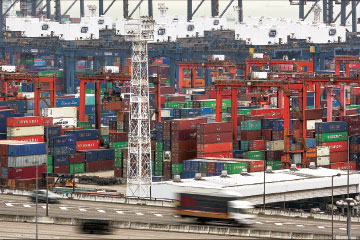Sinking shipping industry eyeing mergers to stay afloat
Updated: 2016-12-02 06:53
By Lin Wenjie in Hong Kong(HK Edition)
|
|||||||
More consolidation and bankruptcies in seaborne business expected in 2017
The global shipping industry is in the midst of a huge downturn with weak demand engulfing it for the past few years. While pundits acknowledge that the sector's biggest hurdle is overcapacity, the wave of mergers and acquisitions means the hard times will eventually pass.
The Baltic Dry Index (BDI), which is used to reflect the prosperity of the shipping industry, plummeted to a record low of 290 points in February this year. Although it rebounded slightly to reach 1,204 points on Wednesday, it's still well below its all-time high of 11,793 points reached on May 20, 2008.
"The most challenging part for the industry right now is overcapacity - too many ships being built with weak demand for seaport trade. It will take a few years for the excessive capacity to be used up," said Maersk China Chairman Tim Smith.
Speaking at the Asian Logistics and Maritime Conference in Hong Kong, he said overcapacity and falling demand for seaborne trade have pushed freight rates to unsustainable levels in the past two years, causing billions of dollars in losses for the world's biggest shipping companies and a near halt to orders for new vessels.
Despite an 11-percent growth in container volume, Maersk Line posted a loss of $116 million for the third quarter of 2016, compared to a $264-million profit in the same period last year. Average freight rates slumped 16 percent compared to last year.
The Danish shipping company ordered 200,000 new vessels this year - a 90-percent reduction compared to last year's 2.3 million - in a bid to cut supply to meet the level of demand.
Following the bankruptcy of South Korea's Hanjin Shipping and the merger of China's two biggest shipping lines - Cosco and China Shipping - Smith anticipates more consolidation, mergers and bankruptcies in the coming year. He emphasized this will bring more stability to the market, saying the sector has been "highly fragmented" for many years.
"Consolidation is a good thing for the industry which will, in turn, bring more stability to the market. Next year, the top seven carriers will control around 65 percent of the capacity," he said.
"The situation cannot be worse, so we are cautiously optimistic that the market will be a little better in 2017."
Although Maersk ended feeder services to 10 Chinese mainland ports this August, Smith still sees large opportunities on the mainland.
"We're not trying to reduce our footprint in China, but to optimize the efficiency of the company's shipping network. And one of the things we hope to benefit from is the growth of e-commerce. China is leading the world in e-commerce. It's a key place to watch," he said.
The logistics industry has always been an important economic pillar for Hong Kong, but the city's status as a global container hub is being challenged.
According to a Hang Seng Management College report, the mainland's relaxation of cabotage rules poses threats to Hong Kong's transshipment services.
The report projects that if the central government fully relaxes cabotage rules to allow overseas shipments to transport cargo between mainland ports, Hong Kong would lose all of its transshipment business tied to the mainland - a possible 14-percent fall in the city's total throughput. Ranked as the world's fifth-busiest container port last year, the SAR would slip out of the top 10 in such a scenario.
However, Smith remains positive about Hong Kong's role as an "effective and competitive port" for the transshipment business. He believed the mainland government would not fully relax cabotage rules as Hong Kong's port position is dependent on the current status quo. He noted that the Hong Kong government has also urged Beijing to keep the rules in place.
Zheng Tianxiang, deputy director of the Center for Studies of Hong Kong, Macao and Pearl River Delta at Sun Yat-sen University, said Hong Kong should reconsider its position as a transportation hub.
"If it continues to increase its mainland-related transshipment volume, it's inevitable for the city to compete with mainland ports. I think Hong Kong should take advantage of its strength to focus on international resources."
To raise the competitiveness of Hong Kong's logistics industry, the report further suggests that Hong Kong should upgrade its logistics facilities and services, establish policies and laws favorable to maritime trade, and expand its terminal capacity.
cherrylin@chinadailyhk.com
|
Containers stacked up at the Hong Kong International Terminal. In the wake of the bankruptcy of South Korea's Hanjin Shipping, Hong Kong is urged to upgrade its logistics facilities and services so as to sharpen its edge in the race to be the region's transportation center. David Paul Morris / Bloomberg |
